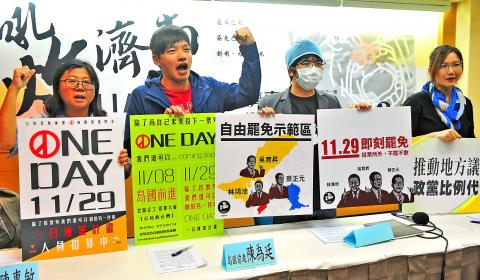Several groups are planning to hold a mass rally next to the Legislative Yuan on Sunday to call for an end to what they say is the hereditary control of local politics and to back demands for reform of the Referendum Act (公民投票法).
Organizers, including Taiwan March, Taiwan Inversion and the Appendectomy Project, said the nation’s electoral politics require a major overhaul to ensure channels for direct democracy.
Chen Wei-ting (陳為廷), a member of Taiwan March and one of the leaders of the Sunflower movement’s 23-day occupation of the legislature’s main chamber in March and early April, called on the public to support calls to reform the Referendum Act.

Photo: Chien Jung-fong, Taipei Times
Chen urged supporters to “return to Jinan Road” in Taipei on Sunday to back demands for direct democracy.
“Under our current political system, citizens are rarely capable of monitoring the actions of politicians,” Chen told a news conference in Taipei, adding that despite public opposition, President Ma Ying-jeou’s (馬英九) administration has continued to promote cross-strait trade agreements.
Citing what they said is the large number of candidates in local councilor elections whose family members hold political office, the activists also urged for the public to demand an end to hereditary control of local politics.
“There is nothing wrong about coming from a family with a political background, however, such candidates often face a lower barrier to entry [into politics] and have more resources in their quest for political office, so they deserve more public scrutiny,” said Urda Yen (嚴婉玲), a member of Taiwan Inversion, a movement that aims to raise the quality of Taiwanese politics.
About one-third of the candidates for city councilor posts in Taipei come from families with political backgrounds, Yen said.
Yen urged supporters to participate in an online vote to determine the “top 10 dominant political families” in Taiwan.
Meanwhile, the Appendectomy Project also announced that it plans to launch a recall campaign against three Chinese Nationalist Party (KMT) lawmakers, with the signature collection to be launched on Nov. 29 to coincide with nine-in-one elections.
The project said the trio — Lin Hung-chih (林鴻池), Wu Yu-sheng (吳育昇) and Alex Tsai (蔡正元), who also serves KMT Taipei mayoral candidate Sean Lien’s (連勝文) campaign director — have failed the public by adhering solely to Ma’s instructions.
“Never in the history of Taiwanese electoral politics has an elected representative been recalled by the people,” an Appendectomy Project representative surnamed Lin (林) said. “We need to set an example, right on election day.”
The name “Appendectomy Project” was chosen for both the group and the recall campaign because in Mandarin Chinese, the term for blue-camp legislators, lan wei (藍委) is pronounced the same as “appendix” (闌尾).

Alain Robert, known as the "French Spider-Man," praised Alex Honnold as exceptionally well-prepared after the US climber completed a free solo ascent of Taipei 101 yesterday. Robert said Honnold's ascent of the 508m-tall skyscraper in just more than one-and-a-half hours without using safety ropes or equipment was a remarkable achievement. "This is my life," he said in an interview conducted in French, adding that he liked the feeling of being "on the edge of danger." The 63-year-old Frenchman climbed Taipei 101 using ropes in December 2004, taking about four hours to reach the top. On a one-to-10 scale of difficulty, Robert said Taipei 101

A preclearance service to facilitate entry for people traveling to select airports in Japan would be available from Thursday next week to Feb. 25 at Taiwan Taoyuan International Airport, Taoyuan International Airport Corp (TIAC) said on Tuesday. The service was first made available to Taiwanese travelers throughout the winter vacation of 2024 and during the Lunar New Year holiday. In addition to flights to the Japanese cities of Hakodate, Asahikawa, Akita, Sendai, Niigata, Okayama, Takamatsu, Kumamoto and Kagoshima, the service would be available to travelers to Kobe and Oita. The service can be accessed by passengers of 15 flight routes operated by

Taiwanese and US defense groups are collaborating to introduce deployable, semi-autonomous manufacturing systems for drones and components in a boost to the nation’s supply chain resilience. Taiwan’s G-Tech Optroelectronics Corp subsidiary GTOC and the US’ Aerkomm Inc on Friday announced an agreement with fellow US-based Firestorm Lab to adopt the latter’s xCell, a technology featuring 3D printers fitted in 6.1m container units. The systems enable aerial platforms and parts to be produced in high volumes from dispersed nodes capable of rapid redeployment, to minimize the risk of enemy strikes and to meet field requirements, they said. Firestorm chief technology officer Ian Muceus said

MORE FALL: An investigation into one of Xi’s key cronies, part of a broader ‘anti-corruption’ drive, indicates that he might have a deep distrust in the military, an expert said China’s latest military purge underscores systemic risks in its shift from collective leadership to sole rule under Chinese President Xi Jinping (習近平), and could disrupt its chain of command and military capabilities, a national security official said yesterday. If decisionmaking within the Chinese Communist Party has become “irrational” under one-man rule, the Taiwan Strait and the regional situation must be approached with extreme caution, given unforeseen risks, they added. The anonymous official made the remarks as China’s Central Military Commission Vice Chairman Zhang Youxia (張又俠) and Joint Staff Department Chief of Staff Liu Zhenli (劉振立) were reportedly being investigated for suspected “serious